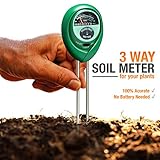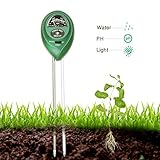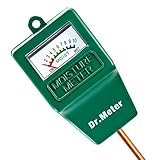Let Us Help You the Best Moisture Meter On the Market
If you struggle to keep your plants healthy and thriving, a soil moisture meter may be just the tool you need to save your garden. These meters, or sensors, check the moisture levels in the soil to let you know whether it’s time to water.

Soil pH Meter
|
Our favorite for 2020
|

MoonCity 3-in-1 Soil Moisture
|
A very close runner-up
|

Covery 3 in 1 Soil Tester Moisture Meter
|
A really great garden gadget
|
And because the probes reach down deep into the soil, the readings are more accurate than simply digging your finger into the soil (the simple way to check soil moisture).
If you’ve never purchased a soil meter, you may not know what to look for. We’re going to make your life a little easier by sharing some of the best meters on the market. Here’s how to compare them:
- Stem Length: The meter’s stem length is important, especially if you’re growing plants in the ground and not containers. The longer the stem, the deeper you can reach down into the soil to get a truly accurate moisture reading. Choose a length that’s appropriate for your garden setup.
- Readings: Does the sensor only check the soil moisture level, or does it also check the pH and light levels? Knowing the pH and light levels will help you determine which adjustments need to be made (if any) to keep your plants healthy. If you only need to know the moisture levels, you can opt for a simpler, more budget-friendly meter.
- Ease of Use: Is the meter easy to use, or does it require a complicated setup? Most meters are simple plug-and-play devices, but more advanced sensors may require calibration. For professionals or serious gardeners, the latter option may be the right choice. For the everyday gardener, a simple meter may be better.
Irrigation Soil Moisture Sensor Reviews
 Soil pH Meter 3-in-1 Soil Test Kit by HealthyWiser – Designed to test for moisture, pH and light, HealthyWiser’s soil test kit is a must-have tool for gardeners. This portable soil moisture meter lets you analyze soil quality on the go and with 100% accuracy. The best part? The meter doesn’t require any batteries.
Soil pH Meter 3-in-1 Soil Test Kit by HealthyWiser – Designed to test for moisture, pH and light, HealthyWiser’s soil test kit is a must-have tool for gardeners. This portable soil moisture meter lets you analyze soil quality on the go and with 100% accuracy. The best part? The meter doesn’t require any batteries.
The meter is a three-in-one model that gives you a complete picture of the health of your soil. If you’re new to gardening, this one simple tool eliminates all of the guesswork, so you can keep your plants healthy.
This compact meter is easy to use – just plug it into the soil. It works indoors and outdoors, so you know exactly when to water and when to adjust the lighting (if necessary).
 MoonCity 3-in-1 Soil Moisture Sensor – The MoonCity 3-in-1 moisture sensor also measures moisture levels, light levels and pH levels. This simple but accurate sensor does not require battery operation, and can be used either indoors or outdoors.
MoonCity 3-in-1 Soil Moisture Sensor – The MoonCity 3-in-1 moisture sensor also measures moisture levels, light levels and pH levels. This simple but accurate sensor does not require battery operation, and can be used either indoors or outdoors.
The meter is extremely easy to read and use, so you know when to adjust the lighting and when to water the soil.
Compact and portable, this meter is a great option for anyone who has an indoor and an outdoor garden.
The MoonCity moisture sensor can be used on all plants, including lawns, flowers, vegetables and more. If you’re new to gardening, this is a moisture sensor that provides versatility and allows for years of use.
 Covery 3-in-1 Soil Moisture Meter – The Covery 3-in-1 soil moisture meter alerts you when it’s time to water your plants, and it also lets you know when pH levels and water levels are low. Like the other meters on this list, this model does not require batteries and is very easy to use. Just plug the meter into the soil, and let it work its magic.
Covery 3-in-1 Soil Moisture Meter – The Covery 3-in-1 soil moisture meter alerts you when it’s time to water your plants, and it also lets you know when pH levels and water levels are low. Like the other meters on this list, this model does not require batteries and is very easy to use. Just plug the meter into the soil, and let it work its magic.
Ideal for both indoor and outdoor use, this meter can measure pH ranges from 3.5-8, moisture ranges from 1-10 and light ranges from 0-2000 lux. With an 18 cm probe length, this meter can reach down deep to get an accurate reading of the soil.
 Dr. Meter Moisture Sensor – The Dr. Meter moisture sensor is a great option for new gardeners who want an entry-level meter. This model only measures the moisture level, so you won’t get readings for the pH and light levels.
Dr. Meter Moisture Sensor – The Dr. Meter moisture sensor is a great option for new gardeners who want an entry-level meter. This model only measures the moisture level, so you won’t get readings for the pH and light levels.
The great thing about this sensor is that it’s so easy to read. The reading system is color coded from red to blue, so you can see at a glance whether you need to water. Red is dry, while blue is wet. Green, the middle color, indicates that the soil is moist.
The compact design of this meter makes it easy to use anywhere and at anytime – indoors or outdoors. No batteries are needed for this meter – just plug in and go.
 REOTEMP MM17 Moisture Meter – The REOTEMP MM17 is a more advanced moisture meter that’s easy to operate and the ideal choice for more experienced gardeners. Offering a durable metal construction, this meter will give you years of use out in the garden.
REOTEMP MM17 Moisture Meter – The REOTEMP MM17 is a more advanced moisture meter that’s easy to operate and the ideal choice for more experienced gardeners. Offering a durable metal construction, this meter will give you years of use out in the garden.
The MM17 has a 17″ stem with a diameter of 5/16.” The meter calibrates to your compost or soil, with a wetness scale of 0-10.
Unlike the other meters on this list, this model requires a single AAA battery, which is included.
While this meter does require an extra step (calibration), it’s extremely accurate and easy to use. If you’re a serious gardener or a professional, this sensor is the best option for you.
Buyer’s Guide – How to Choose the Right Moisture Probe for You
Choosing the right moisture probe can be difficult simply because most of the devices look and behave in the same way. Most sensors are also similar in price, which can complicate things. We talked about some of the most important things to consider when comparing your options. Here are some other things to keep in mind when choosing a meter:

- Power: Does the meter require batteries? Many do not, but some do. Check the power source of the model you’re considering, so you know what you’re up against.
- Reliability: How reliable is the meter? One good way to check the accuracy of a meter is to read reviews from other users. If the sensor’s readings are off, you’re sure to find people complaining of it online.
- Indoor or Outdoor: Is the meter suitable for indoor use, outdoor use, or both? Most – but not all – meters can be used both indoors and outdoors. Still, it’s important to check the product description to make sure the meter is compatible with your garden’s location.
- Cost: The cost of the probe is another consideration. Most meters are very affordable, but some are still more expensive than others. Decide how much you want to spend on a meter, and choose a model that matches your budget.
- Calibration: Does the probe require calibration? Some models, like the last one we reviewed, do require calibration before you can accurately test the soil. The benefit of calibrating the meter is that your results will be more accurate and tuned to your soil.

